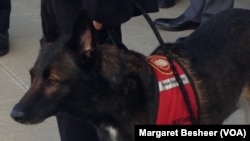Senna is a nine-year-old Belgian Malinois, the dog breed of choice for experts securing areas where there are land mines and unexploded bombs and shells. She is a veteran mine-detection dog who sniffed her way across 1.5 million square meters of Afghanistan during five-and-a-half years of working with the U.S. Air Force there.
Working as teams, handlers and dogs can clear large areas faster than a human working alone. Some 900 dogs like Senna are now working with their handlers in 28 countries affected by mines and explosives.
Their work is highlighted this week in activities leading up to Saturday, the 10th observance of the United Nations' Mine Awareness Day. The occasion is aimed at raising awareness of land mines and working toward their eradication.
The Marshall Legacy Institute in Virginia, a nonprofit group striving to eliminate land mines, owns Senna and purchases, trains and deploys other dogs like her. Most work in the field for up to six years.
“We realized very quickly that you are not going to nurture stability, you are not going to help restore hope, you are not going to help promote growth, and you are not going to alleviate suffering, unless you get rid of the mines,” said Perry Baltimore, the institute's executive director.
The U.N.’s disarmament office says there are still more than 10 million stockpiled mines awaiting destruction around the world. In 60 countries, these deadly remains of war kill or maim about 10 people each day, many of them children. Their presence often slows economic development and post-conflict reconstruction because people cannot use the land for homes or agriculture. The land mines can also hinder the delivery of lifesaving aid.
The U.N. Mine Action Service works in 18 parts of the world to clear, mark and destroy mines and unexploded ordnance and then verify that the area is safe for civilians. The U.N. is also utilizing mine-detection dogs, but on a limited basis because it is still very expensive.
Agnes Marcaillou, director of the Mine Action Service, said the detection dogs are an important tool.
"When we have refugee camps, we walk the dogs around to sniff if somebody brought in explosives," Marcaillou said. "We are walking them at borders, we are walking them in difficult terrain, and we need to continue to do that.”
The U.N. has used detection dogs in Mali, Syria, South Sudan and Somalia.
Senna’s handler, Kimberly McCasland, said that despite the dangers, in the past 20 years only four dogs out of more than 500 have been killed in the line of duty. The rest, like Senna, retire to good homes.





